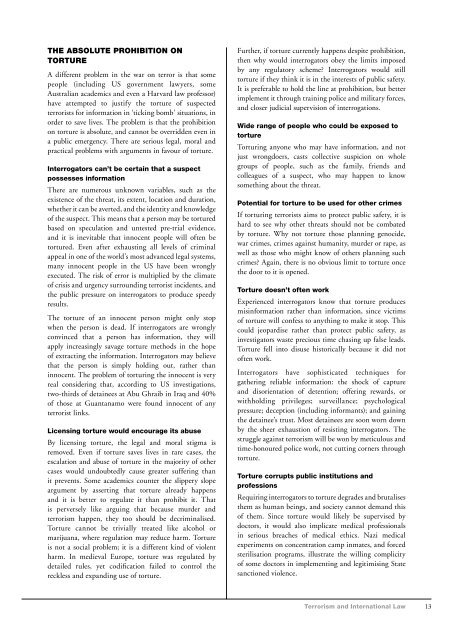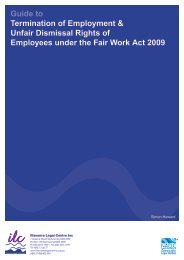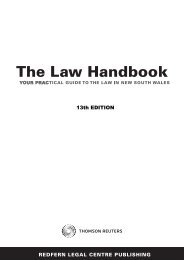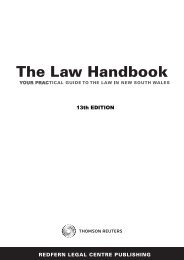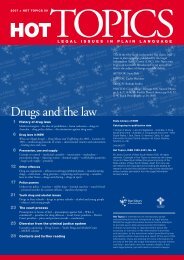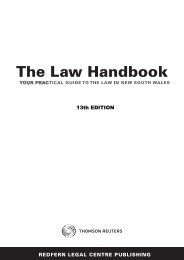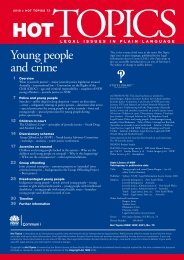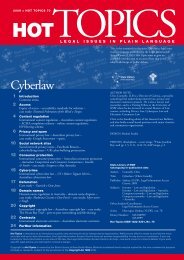THe absOluTe prOHibiTiOn OnTOrTureA different problem in the war on terror is that somepeople (including US government lawyers, someAustralian academics and even a Harvard law professor)have attempted to justify the torture of suspectedterrorists for information in ‘ticking bomb’ situations, inorder to save lives. The problem is that the prohibitionon torture is absolute, and cannot be overridden even ina public emergency. There are serious legal, moral andpractical problems with arguments in favour of torture.interrogators can’t be certain that a suspectpossesses informationThere are numerous unknown variables, such as theexistence of the threat, its extent, location and duration,whether it can be averted, and the identity and knowledgeof the suspect. This means that a person may be torturedbased on speculation and untested pre-trial evidence,and it is inevitable that innocent people will often betortured. Even after exhausting all levels of criminalappeal in one of the world’s most advanced legal systems,many innocent people in the US have been wronglyexecuted. The risk of error is multiplied by the climateof crisis and urgency surrounding terrorist incidents, andthe public pressure on interrogators to produce speedyresults.The torture of an innocent person might only stopwhen the person is dead. If interrogators are wronglyconvinced that a person has information, they willapply increasingly savage torture methods in the hopeof extracting the information. Interrogators may believethat the person is simply holding out, rather thaninnocent. The problem of torturing the innocent is veryreal considering that, according to US investigations,two-thirds of detainees at Abu Ghraib in Iraq and 40%of those at Guantanamo were found innocent of anyterrorist links.Licensing torture would encourage its abuseBy licensing torture, the legal and moral stigma isremoved. Even if torture saves lives in rare cases, theescalation and abuse of torture in the majority of othercases would undoubtedly cause greater suffering thanit prevents. Some academics counter the slippery slopeargument by asserting that torture already happensand it is better to regulate it than prohibit it. Thatis perversely like arguing that because murder andterrorism happen, they too should be decriminalised.Torture cannot be trivially treated like alcohol ormarijuana, where regulation may reduce harm. Tortureis not a social problem; it is a different kind of violentharm. In medieval Europe, torture was regulated bydetailed rules, yet codification failed to control thereckless and expanding use of torture.Further, if torture currently happens despite prohibition,then why would interrogators obey the limits imposedby any regulatory scheme? Interrogators would stilltorture if they think it is in the interests of public safety.It is preferable to hold the line at prohibition, but betterimplement it through training police and military forces,and closer judicial supervision of interrogations.Wide range of people who could be exposed totortureTorturing anyone who may have information, and notjust wrongdoers, casts collective suspicion on wholegroups of people, such as the family, friends andcolleagues of a suspect, who may happen to knowsomething about the threat.potential for torture to be used for other crimesIf torturing terrorists aims to protect public safety, it ishard to see why other threats should not be combatedby torture. Why not torture those planning genocide,war crimes, crimes against humanity, murder or rape, aswell as those who might know of others planning suchcrimes? Again, there is no obvious limit to torture oncethe door to it is opened.torture doesn’t often workExperienced interrogators know that torture producesmisinformation rather than information, since victimsof torture will confess to anything to make it stop. Thiscould jeopardise rather than protect public safety, asinvestigators waste precious time chasing up false leads.Torture fell into disuse historically because it did notoften work.Interrogators have sophisticated techniques forgathering reliable information: the shock of captureand disorientation of detention; offering rewards, orwithholding privileges; surveillance; psychologicalpressure; deception (including informants); and gainingthe detainee’s trust. Most detainees are soon worn downby the sheer exhaustion of resisting interrogators. Thestruggle against terrorism will be won by meticulous andtime-honoured police work, not cutting corners throughtorture.torture corrupts public institutions andprofessionsRequiring interrogators to torture degrades and brutalisesthem as human beings, and society cannot demand thisof them. Since torture would likely be supervised bydoctors, it would also implicate medical professionalsin serious breaches of medical ethics. Nazi medicalexperiments on concentration camp inmates, and forcedsterilisation programs, illustrate the willing complicityof some doctors in implementing and legitimising Statesanctioned violence.terrorism and international Law 13
<strong>Terrorism</strong> does not demand that society torture todefend itself. To the contrary, the threat of terrorism is areminder of the importance of protecting human dignity,even of terrorists. Law necessarily draws moral lines inthe sand which cannot be crossed; the inevitability oftorturing the innocent is a price too high to pay to savethe lives of others. The consequences of forcibly violatingthe body and the mind are profound and signal anunnecessary return to the blunt techniques of medievaljustice. Torture irreparably damages human dignity,devalues human life, and corrupts the institutions of ourdemocracy. As Chief Justice Barak wrote in 1999 in theIsraeli Supreme Court:Although a democracy must fight with one hand tied behind its back, it nonetheless has the upper hand. Preserving the Rule of Law and recognition of an individual’s liberty constitutes an important component in its understanding of security. At the end of they day, they strengthen its spirit and its strength and allow it to overcome its difficulties. 12TerrOrism anD Human rigHTsThe balance between security and liberty alluded to byChief Justice Barak is central to international humanrights law. On one hand, terrorism is a serious humanrights violation, since it attacks the right to life as wellas other civil, political, economic, social and culturalrights. At the same time, if counter-terrorism measuresare excessive, then they too can seriously underminehuman rights, such as freedom from arbitrary detention,the freedoms of movement, expression and association,the right to privacy and the right to a fair trial.While some people argued after 9/11 that human rights law is an obstacle to ensuring the security of society from terrorism, that view misunderstands how human rights law works. Human rights law already allows for rights and freedoms to be limited and balanced against other public interests in a democratic society, including security (see articles 4, 12, 17, 18 and 22 of the ICCPR). Human rights law also demands that no human rightCase sTuDyDavid HicksDavid hicks is an australian citizen who was captured while fighting for the taliban government in afghanistan inDecember 2001. since 2002, he has been detained by the united states at guantanamo Bay, cuba as a suspectedterrorist, but he has not yet been tried for any crime. he is described by the us as an ‘unlawful combatant’ – someonenot entitled to fight under the laws of war – which, the us argues, means he is not entitled to the normal protectionsaccorded to prisoners of war under international humanitarian law (that is, the law of the 1949 geneva conventions).David hicks grew up in australia, and worked in a variety of jobs before heading overseas. in 1998, he told his parentsthat he had joined the Kosovo Liberation army to fight against the serbians in the Balkans. after his return to australia,he converted to islam and went to pakistan to study islam and learn classical arabic. it is thought that he joined theLashka-e-toiba, a Kashmiri islamist group.shortly after 9/11, hicks phoned his father from afghanistan to say that he was going to fight with the taliban againstthe northern alliance. the us alleges that hicks attended an al-Qaeda training camp in afghanistan in 2001, and tookpart in advanced information-gathering (such as surveillance of terrorist targets in Kabul, including the us and uKembassies). on 9 December 2001, hicks was captured by the northern alliance, and was allegedly ill-treated beforebeing handed on to the us authorities. after interrogation by us and australian officials, he was taken to guantanamoBay in January 2002. he is currently the only australian citizen detained there. the us sought to try hicks beforea military commission in 2005, but this was abandoned after the us supreme court declared the process to beunconstitutional and illegal (see Hamdan v Rumsfeld p 11).hicks alleges that he has been subjected him to various forms of abuse and humiliation by us officials during hisdetention at guantanamo Bay. such ill-treatment includes frequent beatings (once for eight hours), sometimes whilerestrained and blindfolded; being forced him to take unknown medication; being deprived of sleep; and being confinedto his cell for 23 hours a day (and once for a full eight month period). he says that similar acts of ill-treatment havebeen carried out on other detainees. these acts could constitute torture, or cruel, inhuman or degrading treatment orpunishment under international human rights law.Whereas the governments of other foreign nationals held at guantanamo Bay have successfully argued for theirrelease, australia has not sought the return of David hicks. one of australia’s arguments is that hicks could not beprosecuted under australian law, because there is no crime in australia against fighting for a foreign government.however, this is currently being challenged in the Federal court of australia on the grounds that it is an ‘irrelevantconsideration’ which should not be taken into account in any lawful decision about hicks’ return to australia. it has alsobeen argued that australia should not be complicit in supporting military commissions since they violate the right to afair trial under the laws of war and human rights law.in 2005, hicks applied for British citizenship, as the British government had negotiated the release of all Britishcitizens detained at guantanamo Bay. there were a number of court cases about his eligibility for British citizenshiphowever, just a few hours after his citizenship was formally registered, the uK home secretary personally revoked it oncharacter grounds.12. Public Committee Against Torture v. State of Israel, Supreme Court of Israel, sitting as the High Court of Justice (September 6, 1999),available at http://elyon1.court.gov.il/files_eng/94/000/051/a09/94051000.a09.htm14HOT TOPICS <strong>58</strong> > <strong>Terrorism</strong>


